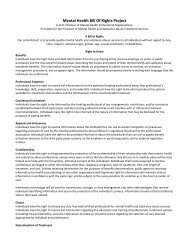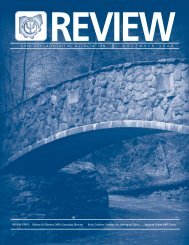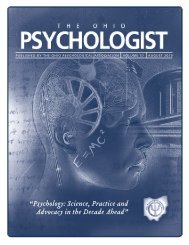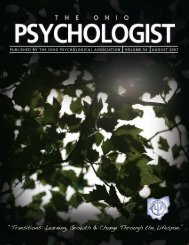The OP Review November 2005 - Ohio Psychological Association
The OP Review November 2005 - Ohio Psychological Association
The OP Review November 2005 - Ohio Psychological Association
You also want an ePaper? Increase the reach of your titles
YUMPU automatically turns print PDFs into web optimized ePapers that Google loves.
A couple of associations (Connecticut and <strong>Ohio</strong>) offer computer<br />
software discounts to their members. Several give their members<br />
discounts for use of online registration for educational events or<br />
online courses.<br />
Summary and Conclusions<br />
Many associations are strapped for staff time and finances to<br />
more actively promote the use of technology to their members.<br />
Additionally, a disincentive for obtaining education in technology<br />
apparently exists in some states in which continuing education<br />
credits are not given for such topics.<br />
Given the limited resources in budgets and staff, associations<br />
might benefit in finding ways to pool efforts and resources with<br />
other associations—even other mental health professional<br />
associations – to offer more educational opportunities to<br />
association members, which could include sponsoring and sharing<br />
expenses for educational events or programs as well as finding<br />
Psych Talk<br />
presenters. Other opportunities for sharing efforts for mutual<br />
benefit could be explored by the association executive directors.<br />
Several associations identified that advocating or promoting<br />
technology use by psychologists was not seen as a high or<br />
moderate level priority and that members had expressed little<br />
interest in the area. Given the rapidity that the healthcare field is<br />
adopting technology and its impact on the practice of psychology,<br />
psychologists need to become more knowledgeable and skilled in<br />
using technology in their daily practices.<br />
Although many psychologists have e-mail addresses and<br />
frequently have given those to their associations, it is not clear<br />
to what extent that they are actually using e-mail for<br />
communications purposes or how often associations are using<br />
e-mail as a major form of communicating with members. It does<br />
appear though that associations are moving toward increased use<br />
of electronic communication with their board members.<br />
Psych Talk is a new feature to the <strong>OP</strong><br />
<strong>Review</strong> that lets <strong>OP</strong>A members share<br />
information about the presentations they<br />
have given or recent publications. Please<br />
submit your 50-100 word blurb to Katie<br />
Crabtree Thomas, director of<br />
communications and education, at<br />
kcrabtree@ohpsych.org. <strong>The</strong> next<br />
deadline is February 1, 2006.<br />
• Paule Steichen Asch, PhD, co-presented<br />
a paper and a poster at the Joint<br />
Conference of the American (AEA) and<br />
Canadian Evaluation <strong>Association</strong>s in<br />
Toronto October 24-30, <strong>2005</strong>. She also<br />
chaired some sessions. Her research<br />
focused on a 12-session wellness<br />
program that was repeated in two<br />
consecutive years in six senior lowhousing<br />
projects. Mostly female single<br />
African-American women over 60 and<br />
with compromised health participated<br />
one year or another and a few attended<br />
both years. Design included thematic<br />
sessions, focusing on cardiovascular<br />
disease healing and a diversity<br />
perspective. Results pointed to two<br />
client profiles: Learners were at lower<br />
health risk and responded to theoretical<br />
education. Doers were at higher risk,<br />
enjoyed group work and focused more<br />
on behavioral techniques. Some sites<br />
performed better than others.<br />
Attendance and spirituality were<br />
significant factors.<br />
• On October 7, <strong>2005</strong>, Kathleen Ashton,<br />
PhD, presented a talk “Resilience and<br />
Mind-Body Health: Coping with<br />
Chronic Illness” to the Myositis<br />
<strong>Association</strong> at their convention in<br />
Cleveland. <strong>The</strong> talk used the APA Public<br />
Education Campaign materials on<br />
“Mind/Body Health: For a Healthy Mind<br />
and Body, Talk to a Psychologist.” Over<br />
100 association members attended the<br />
presentation. Participants discussed<br />
some of their positive experiences about<br />
how working with a psychologist has<br />
helped them to cope with chronic<br />
illness and were able to have questions<br />
answered about how to find an<br />
appropriate psychologist in their area.<br />
• Peter M. Barach, PhD, from<br />
Parma Heights, has been invited to give<br />
two daylong workshops on dissociative<br />
disorders. <strong>The</strong> first, “Adult Dissociative<br />
Disorders in Response to Childhood<br />
Maltreatment: Diagnosis and<br />
Treatment,” was presented on October<br />
17, <strong>2005</strong>, at the Midwest Conference<br />
on Child Sexual Abuse Treatment, in<br />
Madison, WI. <strong>The</strong> second, on a similar<br />
topic, will be given in Ottawa, Ontario,<br />
Canada on April 21, 2006, under<br />
sponsorship of the Centre for Treatment<br />
of Sexual Abuse and Childhood<br />
Trauma. Dr. Barach recently<br />
participated in revising treatment<br />
guidelines for adults with Dissociative<br />
Identity Disorder, issued by the<br />
International Society for the Study<br />
of Dissociation.<br />
• Thurston Cosner, PhD, was a copresenter<br />
of a paper titled, “Exploring<br />
the Implicit Police Work Environment”<br />
at the International Public Management<br />
<strong>Association</strong> Assessment Council<br />
(IPMAAC) Conference in Seattle, WA.<br />
<strong>The</strong> study addressed the paucity of<br />
research on the police work<br />
environment. Ninety-five police officers<br />
from two northeast <strong>Ohio</strong> departments<br />
(Euclid, Cleveland Metroparks) were<br />
administered questionnaires designed to<br />
measure officers’ perceptions of four<br />
cultural and 10 social climate<br />
components of their work environment.<br />
Results were discussed in terms of<br />
differing sets of demands emanating<br />
from cultural and social climate work<br />
environment features, which define the<br />
implicit demand complexity of police<br />
work. Of particular significance was the<br />
finding that contrary to popular<br />
thought; police officers of all ranks and<br />
between both departments appeared to<br />
have a strong preference for an<br />
achievement-oriented culture and a low<br />
preference for power in their<br />
department’s work environment.<br />
• Jeanne Albronda Heaton, PhD, along<br />
with Claudia J. Strauss, published<br />
“Talking to Eating Disorders: Simple<br />
Ways to Support Someone with<br />
Anorexia, Bulimia, Binge Eating, or<br />
Body Image Issues.” <strong>The</strong> book summary<br />
is: When a friend or family member<br />
shows signs of an eating problem, often<br />
our first impulse is to charge in and<br />
give advice, and try to fix what is<br />
wrong. But these tactics—however well<br />
intended—can backfire. In this<br />
compassionate guide, you’ll discover<br />
ways to tackle the tough topics of body<br />
image, media messages, physical touch,<br />
diet, and exercise. <strong>The</strong>re is a special<br />
section on talking about these issues<br />
with children. You’ll learn when to get<br />
professional help, how to handle<br />
emergencies, and answers to difficult<br />
questions such as, “Am I too fat” and<br />
“Is this okay to eat” Dr. Heaton also<br />
participated in presentations about this<br />
topic for the American <strong>Association</strong> of<br />
University and College Center Directors.<br />
• Jennifer Swaim, PhD, is the director of<br />
psycho-oncology research in the<br />
department of psychiatry and<br />
behavioral sciences at Akron General<br />
Medical Center. Her current research<br />
and presentations include:<br />
Mood and Cognitive Functioning in<br />
Ovarian Cancer (current research in<br />
JUNE <strong>2005</strong> 14











